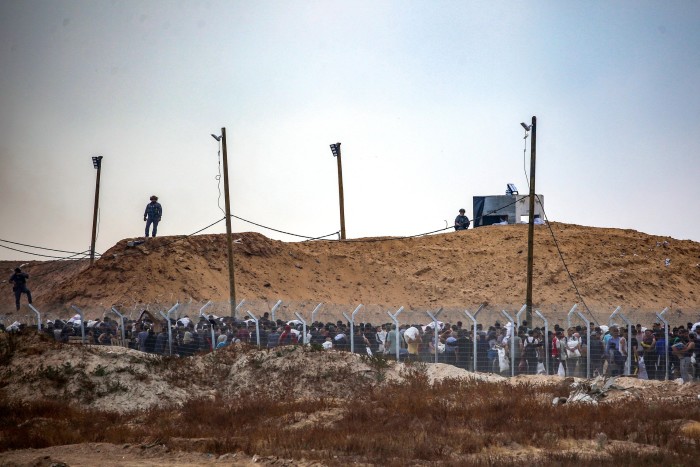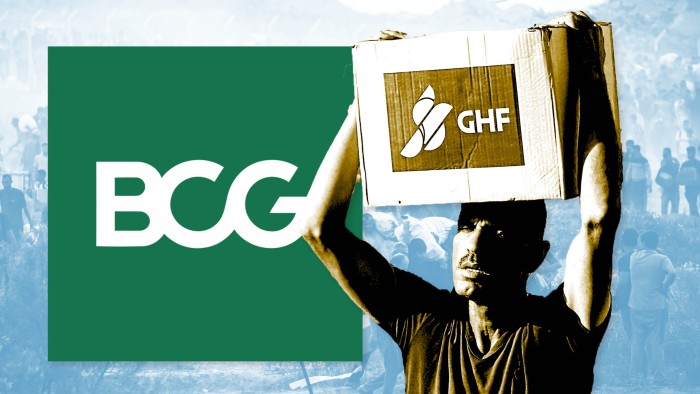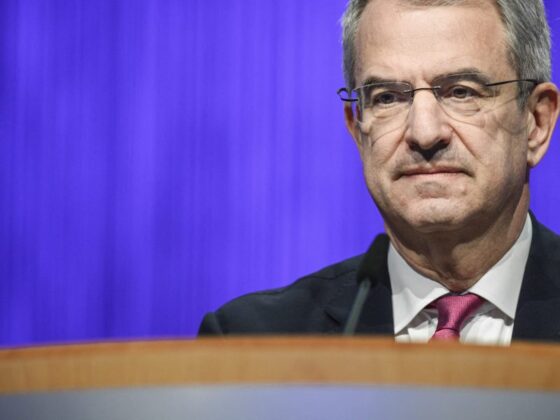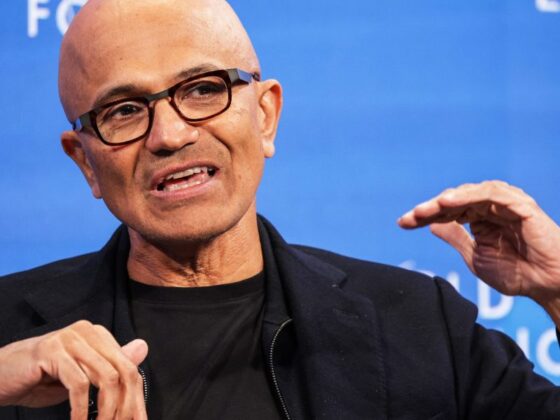Boston Consulting Group modelled the costs of “relocating” Palestinians from Gaza and entered into a multimillion-dollar contract to help launch a new aid scheme for the shattered enclave, a Financial Times investigation has found.
The consulting firm helped establish the Israel- and US-backed Gaza Humanitarian Foundation and supported a related security company but then disavowed the project, which has been marred by the deaths of hundreds of Palestinians, and fired two partners last month.
BCG’s role was more extensive than it has publicly described, according to people familiar with the project, stretching over seven months, covering more than $4mn of contracted work and involving internal discussion at senior levels of the firm.
More than a dozen BCG staff worked directly on the evolving project — codenamed “Aurora” — between October and late May. Senior figures at BCG discussed the initiative, including the firm’s chief risk officer and the head of its social impact practice.
The BCG team also built a financial model for the postwar reconstruction of Gaza, which included cost estimates for relocating hundreds of thousands of Palestinians from the strip and the economic impact of such a mass displacement. One scenario estimated more than 500,000 Gazans would leave the enclave with “relocation packages” worth $9,000 per person, or around $5bn in total.
BCG said the senior figures were repeatedly misled on the scope of the work by the partners running the project. Referring to the work on postwar Gaza, BCG said: “The lead partner was categorically told no, and he violated this directive. We disavow this work.”
GHF operates four distribution sites in Gaza that break with traditional humanitarian models. The militarised system is staffed by US private security contractors and guarded by Israeli forces, which Israel argues is needed to prevent aid from reaching Hamas. The US last week announced $30mn for the effort, whose funding to date has been shrouded in secrecy.
The UN has described GHF as a “fig leaf” for Israeli war aims and humanitarian groups refused to co-operate with it. Since GHF’s chaotic launch in May, Israeli forces have killed more than 400 Palestinians trying to reach distant distribution sites, according to health officials in Gaza.
Nine people familiar with BCG’s work described to the FT how one of the world’s most prestigious consulting firms became ever more deeply enmeshed in a scheme championed by the White House but condemned internationally.
BCG has previously said little about the scale of its involvement. It has described the work as having begun as a pro bono project in October 2024 “to help establish an aid organisation intended to operate alongside other relief efforts”. BCG claimed subsequent work was “unauthorised” and has sought to blame misjudgments by two senior partners from its Washington-based US defence practice.
It told the FT: “Our ongoing investigation by an external law firm has substantiated the deep disappointment we expressed weeks ago. The full scope of these projects was not disclosed, including to senior leadership.”
BCG added that the work carried out was “in direct violation of our policies and processes”. “We stopped the work, exited the two partners who led it, took no fees and launched an independent investigation. We are taking steps to ensure this never happens again.”
BCG was originally engaged by Orbis, a Washington-area security contractor, to help with a feasibility study for a new aid operation, according to people familiar with the early pro bono work.
Orbis was preparing the study on behalf of the Tachlith Institute, an Israeli think-tank. BCG was chosen as a consultant, the people said, because of its long-standing relationship with Phil Reilly, an ex-CIA operative who worked for Orbis.
Reilly was also a part-time adviser to BCG’s defence practice where the two fired partners, military veterans Matt Schlueter and Ryan Ordway, worked.

Using a blueprint fleshed out by Schlueter’s team, Reilly in late 2024 founded Safe Reach Solutions, the security provider for the new aid effort. Separately, a foundation, the GHF, was set up to try to raise funding for the operation from sympathetic governments.
BCG’s team of about half a dozen staff then turned to providing more detailed business planning for SRS and GHF. Reilly, having shifted to being a client of BCG, dropped his advisory role for the firm in December, according to people familiar with the decision and his LinkedIn profile.
The BCG work was led by the US defence practice and staffed mainly from the Washington office. But the initial phase of work helping establish the GHF and SRS was billed to BCG’s social impact practice under the leadership of Rich Hutchinson, who allocated more than $1mn in several tranches to cover the consultants’ pro bono hours.
What BCG called “guardrails” were agreed, which declared the project should not use consultants from the Middle East or Israel to avoid accusations of bias, according to people familiar with the decisions.
In a pivotal decision for BCG that shows how its involvement deepened, by January internal discussions shifted to a new phase of work where the firm would be paid to help establish GHF’s operations on the ground, working out of Tel Aviv.
Hutchinson indicated his openness to budgeting funds to “match” any payments to BCG from the GHF, a common practice that allows consultants in effect to charge half price to charities.

Rather than GHF, the contract for the paid phase of the operation ultimately came from McNally Capital, the Chicago private equity firm that owns Orbis and took an economic interest in the newly established SRS, according to people familiar with the arrangements.
Noting the US government’s appeal for “innovative solutions”, the private equity group told the FT it was “pleased to have supported the establishment of SRS as an important step toward meeting the full scope of the humanitarian need in Gaza”. GHF says it has distributed more than 1mn boxes of aid in Gaza to date, providing more than 58mn meals.
The ultimate sources of funding for GHF and SRS remained opaque, even to members of the BCG team. At one point, as recently as April, funding appeared to dry up and many SRS security contractors returned home from the Middle East. With its fee guaranteed by McNally, BCG stayed in Tel Aviv to continue planning work.
A person familiar with GHF told the FT in May that it had been pledged $100mn from a nation that the person refused to name. At various points, there was speculation that the UAE or a European country might fund the GHF.
Schlueter repeatedly told colleagues that he expected multilateral support to be forthcoming. Christoph Schweizer, BCG chief executive, wrote in a message to alumni last month that the fired partners “led us to believe the effort had broad multi-lateral support from several countries and NGOs”.
Schlueter and Ordway did not reply to FT messages seeking comment.

The initial contract signed with McNally in early March committed BCG to provide eight weeks of work to help build out SRS’s operations, with a team that included at least two consultants on the ground in Tel Aviv, for a total fee of more than $1mn.
A new project code was entered for the work in BCG’s internal systems. Travel approvals were given by officials in BCG’s risk management operation, although it remains unclear how high up the organisation those approvals went.
Schlueter held conversations with BCG’s chief risk officer, Adam Farber, in March, according to people familiar with the meetings. In the middle of that month, Schlueter flew from Tel Aviv to Paris for the social impact practice area meeting to discuss the work, several people said.
In Tel Aviv, BCG’s consultants were aiding SRS in developing the business side of its operations.
This included advising on how to move supplies to distribution sites, evaluating bids from potential construction and security contractors and providing other financial guidance. While SRS was far from a typical client, such advice was in line with BCG’s normal commercial work.
A separate side project taken on by Schlueter’s team in April stood out as more unusual and pursued without the knowledge of senior management and in contravention of their instructions, according to BCG.
Several Israeli backers of the GHF initiative were also working on an exercise imagining Gaza after the war and how its reconstruction could be achieved. The effort was likened by people involved to other postwar blueprints developed by the Egyptian government and the Rand think-tank.

The Israeli backers had BCG produce a complex financial model whose assumptions could be used for testing a range of scenarios, including one where large swaths of the Palestinian population were relocated out of Gaza. Two months earlier US President Donald Trump had suggested emptying the shattered strip of its 2.2mn people so it could be rebuilt as the “Riviera of the Middle East” — a plan rights groups and UN officials equated to ethnic cleansing.
BCG’s model provided assumptions for the costs of voluntary relocations of Gazans, rebuilding civilian housing and using innovative financing models such as “tokenisation” of real estate via blockchain technology. It also allowed calculation of possible GDP outcomes from reconstruction.
Under the scenario modelled for “voluntary relocation”, Gazans would have been given a package to leave the enclave including $5,000, subsidised rent for four years and subsidised food for a year. It assumed a quarter of Gazans would leave, and that three-quarters of those relocated would never return.
One person with knowledge of the work said: “There is no coercive element here and the plan is not incentivising people to leave. The 25 per cent is a ‘plug number’. The people of Gaza will decide. It is not a plan to empty Gaza.”
The model calculated relocation outside Gaza to be $23,000 cheaper, per Palestinian, than the costs of providing support to them in Gaza during reconstruction.
The BCG team did not design the postwar blueprint that it financially modelled, according to several people familiar with the exercise. But the existence of the project caused uproar when it became known internally in late May because of the risks of being associated with a plan to displace Palestinians.
Schlueter told colleagues the work was encompassed by the existing contract with McNally and did not need new approvals, according to several people familiar with the events.
While BCG staff continued to be motivated by the goal of providing food into an enclave cut off from aid by an Israeli blockade, opposition from the humanitarian community hardened throughout April.
Once it became clear that NGOs would not provide aid for distribution, BCG staff began to help SRS in planning the procurement of food supplies themselves. The switch caused one team member to raise concerns that SRS was not equipped to conduct such a complex operation and that the project was deviating from humanitarian principles.
Friction between the team member and SRS led to her being removed from the project, according to several people.
The work for those that remained was intense. Members of the BCG team in Tel Aviv were named on BCG’s “Red Zone Report” as staff who worked more than 70 hours a week. The report is circulated widely inside the firm to call out partners who may be overworking their junior employees.
SRS continued to be reliant enough on BCG’s business advice that McNally extended the contract for two more months in early May as the operation geared up to begin aid distribution. The private equity group’s backing provided for three more US BCG consultants in Tel Aviv and took the total fees BCG had planned to bill to around $4mn, people familiar with the matter said.
The expansion coincided with GHF’s public launch, following Israeli cabinet approval, and the UN’s condemnation of the effort. Project Aurora quickly began to attract a higher level of scrutiny within BCG. Concerns only grew as US newspapers reported on Israel’s backing for the GHF plan.
On May 25 the decision was taken to pull the team out of Tel Aviv, shut down the work and not to collect the money that had been invoiced. The same day, on the eve of the first distribution centre opening, GHF’s chief executive Jake Wood resigned, saying the effort was incompatible with humanitarian principles of neutrality.
At a meeting of BCG’s most senior global partners in Vienna on May 28, Schlueter and Ordway were questioned about the work. By the time the Washington Post reported on June 3 that BCG had quit the effort — the first public disclosure of the firm’s involvement — the decision had been taken to put the two men on administrative leave.
They were asked to resign on June 4. An external law firm, WilmerHale, is now helping BCG’s legal team investigate what Schweizer called the “process failures”.
“We are acting with urgency and seriousness to learn from this and to ensure it does not happen again,” he told alumni last month. “Our ambition is and has always been to contribute to effective, multilateral and sustainable humanitarian responses. We are committed to living our values with accountability for our failures and humility in how we move forward.”













